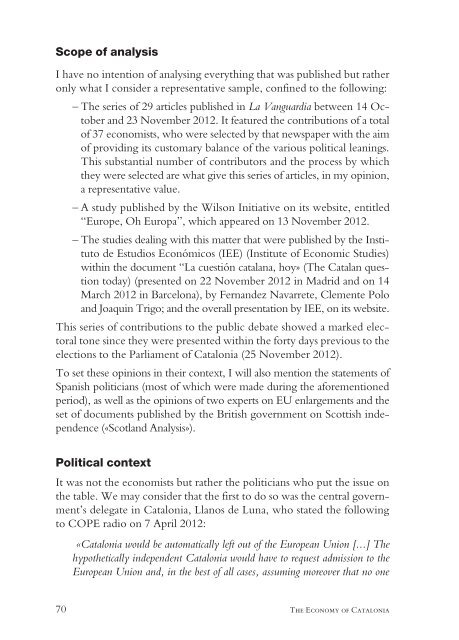The Economy of Catalonia
the_economy_of_catalonia._questions_and_answers_on_the_economic_impact_of_independence
the_economy_of_catalonia._questions_and_answers_on_the_economic_impact_of_independence
Create successful ePaper yourself
Turn your PDF publications into a flip-book with our unique Google optimized e-Paper software.
Scope <strong>of</strong> analysis<br />
I have no intention <strong>of</strong> analysing everything that was published but rather<br />
only what I consider a representative sample, confined to the following:<br />
– <strong>The</strong> series <strong>of</strong> 29 articles published in La Vanguardia between 14 October<br />
and 23 November 2012. It featured the contributions <strong>of</strong> a total<br />
<strong>of</strong> 37 economists, who were selected by that newspaper with the aim<br />
<strong>of</strong> providing its customary balance <strong>of</strong> the various political leanings.<br />
This substantial number <strong>of</strong> contributors and the process by which<br />
they were selected are what give this series <strong>of</strong> articles, in my opinion,<br />
a representative value.<br />
– A study published by the Wilson Initiative on its website, entitled<br />
“Europe, Oh Europa”, which appeared on 13 November 2012.<br />
– <strong>The</strong> studies dealing with this matter that were published by the Instituto<br />
de Estudios Económicos (IEE) (Institute <strong>of</strong> Economic Studies)<br />
within the document “La cuestión catalana, hoy» (<strong>The</strong> Catalan question<br />
today) (presented on 22 November 2012 in Madrid and on 14<br />
March 2012 in Barcelona), by Fernandez Navarrete, Clemente Polo<br />
and Joaquin Trigo; and the overall presentation by IEE, on its website.<br />
This series <strong>of</strong> contributions to the public debate showed a marked electoral<br />
tone since they were presented within the forty days previous to the<br />
elections to the Parliament <strong>of</strong> <strong>Catalonia</strong> (25 November 2012).<br />
To set these opinions in their context, I will also mention the statements <strong>of</strong><br />
Spanish politicians (most <strong>of</strong> which were made during the aforementioned<br />
period), as well as the opinions <strong>of</strong> two experts on EU enlargements and the<br />
set <strong>of</strong> documents published by the British government on Scottish independence<br />
(«Scotland Analysis»).<br />
Political context<br />
It was not the economists but rather the politicians who put the issue on<br />
the table. We may consider that the first to do so was the central government’s<br />
delegate in <strong>Catalonia</strong>, Llanos de Luna, who stated the following<br />
to COPE radio on 7 April 2012:<br />
«<strong>Catalonia</strong> would be automatically left out <strong>of</strong> the European Union [...] <strong>The</strong><br />
hypothetically independent <strong>Catalonia</strong> would have to request admission to the<br />
European Union and, in the best <strong>of</strong> all cases, assuming moreover that no one<br />
70 <strong>The</strong> <strong>Economy</strong> <strong>of</strong> <strong>Catalonia</strong>


